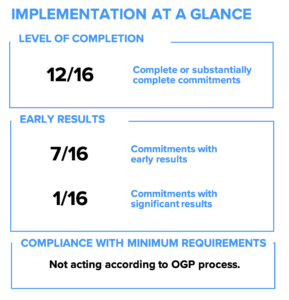Croatia Results Report 2022-2024
- Action Plan: Croatia Action Plan 2022-2024 (June)
- Dates Under Review: 2022-2024
- Report Publication Year: 2022
Croatia’s fourth OGP action planAction plans are at the core of a government’s participation in OGP. They are the product of a co-creation process in which government and civil society jointly develop commitments to open governmen... resulted in notable improvements to lobbyingLobbying transparency allows the public to ensure that there is diversity of participation and contribution to public decision-making. Technical specifications: Policies and actions affecting lobbying... transparencyAccording to OGP’s Articles of Governance, transparency occurs when “government-held information (including on activities and decisions) is open, comprehensive, timely, freely available to the pub... More and to fiscal transparency. Most commitments were completed, but less than half led to early resultsEarly results refer to concrete changes in government practice related to transparency, citizen participation, and/or public accountability as a result of a commitment’s implementation. OGP’s Inde... More. The co-creation and implementation processes were generally participatory, but civil society stakeholders have expressed less enthusiasm for participating in the OGP process.
 Early Results
Early Results
Croatia’s fourth action plan contained 16 commitments. It mostly built on the previous action plan, with commitments around increasing transparency of parliament, financial information, civil society funding, publicly owned companies, and official documents. Other topics were whistleblower protection open dataBy opening up data and making it sharable and reusable, governments can enable informed debate, better decision making, and the development of innovative new services. Technical specifications: Polici..., improving consultation processes, and stimulating open government at the local and regional levels. New themes dealt with protection of personal data, and improving the transparency of state asset management.
The IRM Action Plan Review identified two commitments as promising: Commitment 12 on anti-corruption and Commitment 8 on media regulatory framework.[1] Commitment 12 resulted in the implementation of activities from the 2021-2030 Anti-Corruption Strategy, including the passage of the Lobbying Act, Croatia’s first legal regulations on lobbying. Commitment 8 achieved moderate early results owing to a milestone on fighting disinformation but did not lead to the passage of legislative changes. This commitment has remained incomplete since the third action plan (2018-2020).[2] Commitment 3 saw moderate early results in fiscal transparency through the timely publication of public spending data in open formats. Nine commitments had no notable results. In general, the commitments were less ambitious with fewer early results than in previous action plans, where three commitments resulted in major changes in opening government.[3]
CompletionImplementers must follow through on their commitments for them to achieve impact. For each commitment, OGP’s Independent Reporting Mechanism (IRM) evaluates the degree to which the activities outlin... More
Croatia fully completed 10 commitments and substantially completed two commitments. The commitments with limited implementation suffered delays in drafting relevant legislation, including the Referenda Act (Commitment 5) and the Media Act (Commitment 8), or in relevant IT infrastructure (Commitment 6). In general, implementation was more successful in this action plan compared to the previous plan, as many milestones in the previous cycle were not completed because of the COVID-19 pandemic. Commitments that involved education, training, or technical modifications of existing systems or public services were mostly completed. In including activities linked to EU-funded projects, strategic plans and other activities (mostly involving training and education), the government opted to reduce the ambition of commitments.[4]
Participation and Co-Creation
The Croatian Council for the OGP Initiative (OGP Council), counting 26 members representing state, local, and regional authorities, civil society organizations (CSOs), academia, and the media, is Croatia’s multistakeholder forum.[5] The Government Office for Non-Governmental Organizations provides administrative support to the Council, in cooperation with the Ministry of Foreign and European Affairs, whose Secretary of State chairs it. The government engaged civil society in iterative dialogue throughout the co-creation process and engaged the public twice via the e-consultation portal. CSOs had opportunities to voice their opinions on commitment implementation and provide recommendations at OGP Council sessions, even though the sessions were less frequent than the minimum requirements under OGP’s standard (two per year).[6] Government representatives were open to dialogue and collaboration during implementation and monitoring of the action plan, where there was opportunity for non-governmental stakeholders to affect the outcomes. Despite consensual decision-making and the good will of each member of the OGP Council, government and CSO representatives felt less enthusiasm for participation than in previous action plan cycles. Civil society stakeholders believe this could be remedied by increasing the ambitiousness of commitments in the future.
Implementation in context
Implementation of the action plan was not significantly disturbed by the super-election year in 2024 (including parliamentary, European parliamentary and presidential electionsImproving transparency in elections and maintaining the independence of electoral commissions is vital for promoting trust in the electoral system, preventing electoral fraud, and upholding the democr... More). Negative influences on implementation of the action plan included the tying up of key governmental resources and having priority over other endeavors. The most significant factor that supported implementation of the action plan was achieving Organisation for Economic Co-operation and Development (OECD) standards. Croatia’s accession into the OECD remains the main political priority for the current government.
[1] Open Government Partnership, IRM Action Plan Review: Croatia 2022-2024, https://www.opengovpartnership.org/wp-content/uploads/2023/01/Croatia_Action-Plan-Review_2022-2024_EN_for-public-comment.pdf
[2] Open Government Partnership, IRM Transitional Results Report: Croatia 2018-2020, p 13, https://www.opengovpartnership.org/wp-content/uploads/2021/06/Croatia_Transitional-Results_Report_2018-2020_EN.pdf
[3] Open Government Partnership, IRM Transitional Results Report: Croatia 2018-2020, https://www.opengovpartnership.org/wp-content/uploads/2021/06/Croatia_Transitional-Results_Report_2018-2020_EN.pdf
[4] According to stakeholders interviewed for the 2022-2023 Action Plan Review, https://www.opengovpartnership.org/wp-content/uploads/2023/02/Croatia_Action-Plan-Review_2022-2024_EN.pdf
[5] Open Government Partnership Council, Savjet inicijative Parnerstvo za otvorenu vlast, 23 September 2024, https://udruge.gov.hr/istaknute-teme/partnerstvo-za-otvorenu-vlast-271/savjet-inicijative-partnerstvo-za-otvorenu-vlast/289; Croatia’s End-of-Term Self-Assessment Draft Report, September 2024; and Saša Šegrt (Government Office for Cooperation with NGOs), interview by the IRM, 31 July 2024.
[6] OGP Council session details are found at Government Office for Cooperation with NGOs, Savjet inicijative Partnerstvo za otvorenu vlast [Open Government Partnership Council], 23 September 2024, https://udruge.gov.hr/istaknute-teme/partnerstvo-za-otvorenu-vlast-271/savjet-inicijative-partnerstvo-za-otvorenu-vlast/289

Leave a Reply